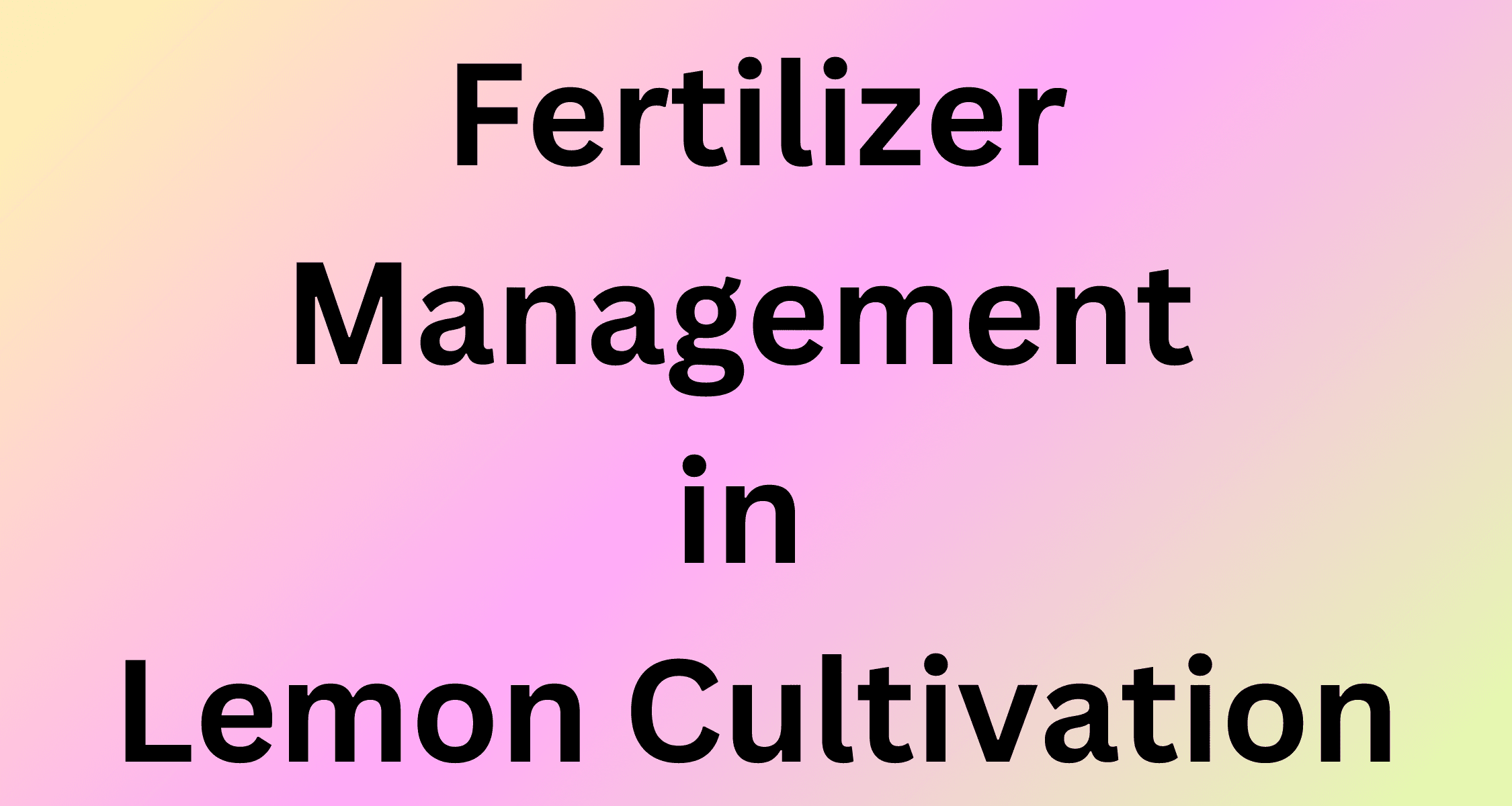Fertilizer Management in Lemon Cultivation

Lemon cultivation is practiced across almost all regions of India. Lemons are rich in vitamin C and are an important fruit crop. Proper fertilizer management in citrus fruits like lemons and acid lime is crucial. It not only promotes plant growth but also improves fruit yield and quality. This article provides comprehensive information on fertilizer management in lemons, detailing the quantities, timing, and methods of fertilizer application according to different stages and plant ages.
Crop Growth Stages & Fertilizer Application in Lemon
Planting Time
- When lemon plants are planted, they require initial nutrients to strengthen their roots and establish the plant well. During this time, use 10-15 kg of cow dung manure or compost per plant. Provide 50-100 grams of Single Super Phosphate (SSP) for phosphorus and 50-100 grams of Muriate of Potash (MOP) per plant. Mix the fertilizers in a 30-45 cm deep pit dug around the plant, then cover with soil and water the plant.
Growing Stage
- In this stage, lemon plants experience rapid growth and need sufficient nutrition. Apply 200-250 grams of urea per plant for nitrogen (N), which helps in the growth of green leaves. Provide 150-200 grams of phosphorus (P) and potash (K) per plant. Distribute the fertilizers around the plant, slightly away from the stem, and water lightly to ensure good nutrient absorption.
Flowering and Fruiting Stage
- During this stage, lemon plants require special care to increase the number of flowers and improve the quality of fruits. Use 250-300 grams of NPK (12:32:16) and 100-150 grams of calcium nitrate per plant. This enhances the quality and size of the fruits. Apply micronutrients like zinc, iron, and manganese as a foliar spray. Spray the fertilizers on the leaves or apply them around the roots and irrigate.
Post-Harvest Stage
- After harvesting, plants need nutrients to recover and prepare for the next season. The amount of cow dung manure should be 15-20 kg per plant. Apply 200-250 grams of NPK mixture per plant and 25 grams of zinc sulfate per plant (once a year). Apply the fertilizers around the roots and water lightly to ensure the plants receive the necessary nutrients.
Fertilizer Management Based on Plant Age
- Young Plants (1-3 years): Apply 10-40 kg of cow manure per plant. Additionally, provide 200-600 grams of urea, 250-750 grams of single super phosphate, and 100 grams of muriate of potash per plant. Use these fertilizers at the end of December, applying half the urea in February and the remaining half in April. Also, spray a solution of 5 grams of zinc sulfate per liter and 10 grams of urea per liter in May-June and August-September.
- Middle-Aged Plants (4-6 years): For these plants, apply 40-70 kg of cow manure per plant, 750-1250 grams of urea, 1000-1500 grams of single super phosphate, and 150 grams of muriate of potash per plant. Use these fertilizers at the end of December, applying half the urea in February and the remaining half in April.
- Mature Plants (7 years and above): Apply 100 kg of cow dung manure per plant, 1500 grams of urea, 2 kg of single super phosphate, and 175 grams of muriate of potash per plant. Apply cow dung manure, single super phosphate, and muriate of potash at the end of December. Apply half of the urea in February and the remaining half in April.
Precautions in Fertilizer Management
- Avoid Overuse of Fertilizers: Excessive fertilizer use can burn roots and cause environmental pollution.
- Avoid Applying Fertilizers on Leaves: Fertilizers on leaves can cause them to burn and affect plant growth.
- Irrigate After Fertilizer Application: Water immediately after applying fertilizers to ensure nutrients reach the roots.
- Manage Pests and Diseases: Regularly follow pest and disease management practices to keep plants healthy.
- Conduct Soil Testing: Conduct soil tests to identify nutrient deficiencies and select fertilizers accordingly.
- Use Organic Fertilizers: Use organic fertilizers like cow manure, compost, and green manure to enhance soil fertility and protect the environment.
What fertilizers do you use in lemon cultivation? Share your responses and experiences in the comments. For more such interesting and important information, follow the 'Krishi Gyan' channel now. And if you liked the post, don't forget to like and share it with your fellow farmers.
Frequently Asked Questions (FAQs)
Q: How many years does it take for a lemon tree to bear fruit?
A: The process of fruiting in a lemon plant takes time. Generally, lemon plants start bearing fruit about three to three and a half years after planting. In the early years, the quantity of fruit is low, but as the plant matures, the number and size of the fruits increase. After five years, a mature lemon tree can begin to yield up to 100 kilograms of fruit.
Q: How long does it take for a lemon tree to flower?
A: Lemon trees produce beautiful, white, and fragrant flowers that can appear throughout the year. However, the abundance of these flowers is typically seen at the end of winter. The process of fruit formation begins with the blooming of flowers, and the fruit takes about 12 months to ripen. This is why both flowers and fruits can be seen on the trees simultaneously.
Q: Which lemon tree variety is the best?
A: The best variety of lemon is the 'Kagzi' lemon. Farmers can contact the horticulture department's nursery to obtain Kagzi lemon plants.
Q: Why is it important to test the soil before applying fertilizer to a lemon tree?
A: It is important to test the soil before applying fertilizer to a lemon tree to understand the nutrient status and pH level of the soil. This information helps in determining the right amount and type of fertilizer, ensuring that the plants receive proper nutrition and improving crop productivity.
Q: When and how should fertilizer be applied to a lemon tree?
A: Fertilizer should be applied to lemon trees during early spring and summer when the plant's growth is at its peak. Sprinkle the fertilizer around the tree's roots and then water well so that the fertilizer is absorbed into the soil and the plants receive full benefit.
जारी रखने के लिए कृपया लॉगिन करें

फसल चिकित्सक से मुफ़्त सलाह पाएँ
